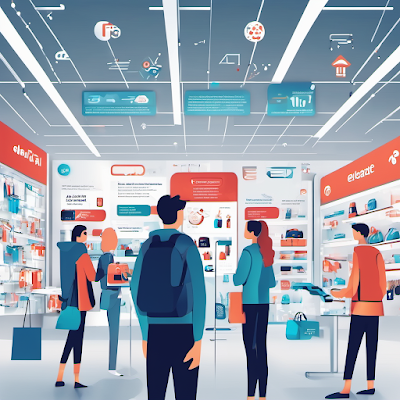AI, once a futuristic concept, has seamlessly woven itself into the fabric of various industries, and retail is no exception. The integration of Artificial Intelligence (AI) solutions in retail has become a game-changer, revolutionizing the way businesses operate and customers engage with brands. In this article, we'll delve into the myriad ways AI is elevating retail experiences, from personalized customer interactions to optimizing inventory management.
1. Introduction to AI in Retail
Defining AI solutions
AI, in the retail context, involves the use of advanced technologies like machine learning and data analytics to enhance various aspects of the business.
Significance in the retail sector
The retail landscape is fiercely competitive, and AI provides the edge needed to stay ahead by improving efficiency, reducing costs, and increasing customer satisfaction.
2. Personalized Customer Experiences
Tailoring recommendations
One of the standout features of AI in retail is its ability to analyze customer preferences and behavior, enabling businesses to offer tailored product recommendations.
Enhanced customer satisfaction
When customers feel understood and catered to, satisfaction levels soar, leading to increased loyalty and repeat business.
3. Inventory Management with AI
Optimizing stock levels
AI algorithms predict demand patterns, allowing retailers to optimize stock levels, preventing both overstock and understock scenarios.
Preventing overstock and understock situations
This proactive approach minimizes losses due to excess inventory and ensures that popular products are always available.
4. AI-Driven Visual Merchandising
Creating appealing product displays
AI analyzes customer responses to different visual elements, helping retailers design captivating displays that entice shoppers.
Boosting sales through visual appeal
Eye-catching displays not only improve the overall shopping experience but also contribute to increased sales.
5. AI-Powered Virtual Shopping Assistants
Improving customer assistance
Virtual shopping assistants powered by AI provide real-time assistance, guiding customers through product choices and answering queries.
Enhancing the shopping journey
By offering personalized guidance, AI-driven virtual assistants create a more engaging and satisfying shopping journey for customers.
6. Fraud Detection and Prevention
Securing transactions with AI
AI algorithms detect irregular patterns in transactions, flagging potential fraudulent activities and securing customer data.
Reducing fraudulent activities
The proactive nature of AI in fraud prevention reduces financial losses and safeguards the reputation of retail businesses.
7. AI in Pricing Strategies
Dynamic pricing for competitiveness
AI analyzes market trends and competitor pricing to dynamically adjust prices, ensuring competitiveness and maximizing revenue.
Maximizing revenue through smart pricing
This dynamic pricing strategy allows retailers to optimize revenue by aligning prices with market demand and consumer behavior.
8. Supply Chain Optimization
Streamlining logistics with AI
AI optimizes supply chain processes by predicting demand, managing inventory efficiently, and improving overall logistics.
Reducing costs and improving efficiency
Efficient supply chain management results in cost savings and ensures that products reach customers in a timely and cost-effective manner.
9. Data Analytics for Business Insights
Harnessing data for decision-making
AI-driven data analytics provide valuable insights into customer behavior, enabling informed decision-making for business strategies.
Understanding customer behavior
Analyzing customer data helps retailers understand preferences, trends, and areas for improvement, enhancing overall business strategies.
10. AI for Customer Retention
Loyalty programs and personalized incentives
AI enables the creation of personalized loyalty programs and incentives, fostering customer retention and long-term relationships.
Building long-term relationships
By understanding individual customer needs, retailers can tailor loyalty programs that resonate, ensuring sustained customer loyalty.
11. Integrating AI in E-commerce Platforms
Enhancing online shopping experiences
E-commerce platforms leverage AI to enhance the online shopping experience, from personalized recommendations to seamless checkouts.
Increasing conversion rates
A user-friendly and personalized online shopping experience increases the likelihood of conversion, boosting overall sales.
12. Challenges in Implementing AI Solutions
Technological barriers
Despite the benefits, implementing AI solutions comes with technological challenges, including the need for robust infrastructure and skilled personnel.
Staff training and adaptation
Ensuring that staff is adequately trained to work with AI systems is crucial for successful implementation and optimal results.
13. Case Studies of Successful AI Implementations
Highlighting real-world examples
Examining successful case studies showcases the tangible benefits and positive impact AI has had on various retail businesses.
Demonstrating positive outcomes
Real-world success stories serve as inspiration and guidance for other retailers considering the integration of AI solutions.
14. Future Trends in AI for Retail
Evolution of AI in the retail landscape
Anticipating future trends, such as increased automation, augmented reality integration, and further advancements in AI, prepares retailers for what lies ahead.
Anticipated advancements and innovations
As technology evolves, so do AI applications in retail, promising exciting innovations that will continue to shape the industry.
15. Conclusion
Summarizing the impact of AI in retail, it's evident that embracing AI solutions is not just a trend but a strategic necessity. From personalized customer experiences to optimized operations, AI offers a plethora of benefits for retailers looking to thrive in a dynamic market.
5 Unique FAQs
How does AI improve customer satisfaction in retail? AI enhances customer satisfaction by analyzing preferences, tailoring recommendations, and providing personalized shopping experiences.
What challenges do retailers face in implementing AI solutions? Retailers encounter challenges such as technological barriers, the need for infrastructure, and ensuring staff is adequately trained to work with AI systems.
Can AI-powered virtual shopping assistants replace human customer service? While AI-powered virtual assistants enhance customer service, human interaction remains essential for certain complex queries and personalized assistance.
What are the future trends in AI for the retail industry? Anticipated trends include increased automation, augmented reality integration, and continuous advancements in AI applications to reshape the retail landscape.
How does AI contribute to supply chain optimization in retail? AI optimizes supply chain processes by predicting demand, managing inventory efficiently, and improving logistics, resulting in cost savings and improved efficiency.


Comments
Post a Comment